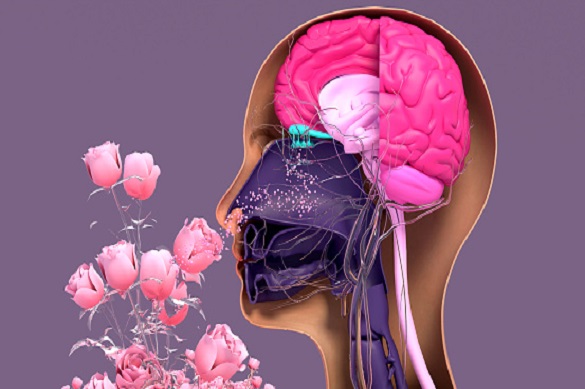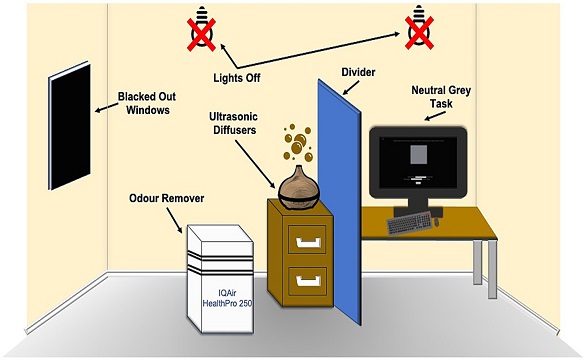
The University of Liverpool is part of a new study that reveals for the first time how particular scents can influence our perception of colour.
In a paper published in the journal Frontiers in Psychology, an interdisciplinary research team of University of Liverpool psychologists and engineers undertook an experiment to determine if smell does indeed affect how we perceive colour.
The experiment involved 24 participants aged beteween 20 and 57 sitting in front of a screen in an isolation room with blacked out windows and no unwanted sensory stimuli or odours.
Then an ultrasonic diffuser released one of six scents – caramel, cherry, coffee, lemon, and peppermint, plus odourless water as a control – into the room. The scents were chosen as they induced the most robust odour-colour associations in the team’s prior work.
The participants were then asked to modify a square filled with a greyish colour on a screen using two adjustable sliders – one yellow to blue, and another one red to green – until they reached a colour they judged as being devoid of any hue, that is, a perfect neutral grey colour.

The results revealed that participants chose a more red-brown colour grey when they smelt coffee, while opting for a yellow-brown version of the grey when the odour of caramel was pumped into the room.
The lead author of the paper is Dr Ryan Ward, a senior lecturer at Liverpool John Moores University, who undertook the study when he was with the University of Liverpool’s Department of Electrical Engineering and Electronics (EEE) and Digital Innovation Facility (DIF).
He said: “Here we show that the presence of different odours influences how humans perceive colour. Our results showed that the perception of grey trended towards their anticipated correspondences for four out of five scents, namely lemon, caramel, cherry, and coffee.”
The research is part of an unusual but exciting collaboration between Professor Alan Marshall, from the University’s Department of EEE who heads up the Immersive Reality laboratory at the DIF, and Sophie Wuerger, Professor of Vision Science with the Department of Psychology.
They are working together to explore how olfactory information can be sent remotely and also how it influences our perception. Their longer-term research focus is the effective inclusion of olfactory information in Virtual Reality using their interdisciplinary expertise and the unique facilities in the Immersive Reality laboratory.
Professor Wuerger said: “Research on the interactions between the sense of smell and vision is a fairly new area. The novelty of our experiment is that we used a robust tool to measure small perceived colour changes and assess the perceived colour in a more objective way which requires know-how of vision science. We believe we are the first team to do this.”
Professor Alan Marshall said: “This is an exciting area of research which is important if we are to understand better how our senses influence our overall perception, which will also be a critical factor in designing the next generation of “immersive reality” systems, such as the Metaverse, and has application not just in entertainment, but across a wide range of VR systems including the creative arts, training, education and healthcare.”
The paper `Odors modulate color appearance’ (doi:10.3389/fpsyg.2023.1175703) is published in the journal Frontiers in Psychology.
The research was funded by the Engineering and Physical Sciences Research Council (EPSRC).